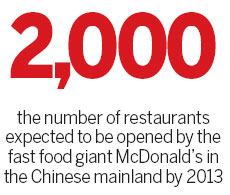Food outlets raise prices as operating costs begin to rise
Updated: 2012-01-20 11:00
By Li Woke (China Daily)
|
|||||||||||
BEIJING - McDonald's Corp has increased the prices of some of the items on its menus in China, as the country prepares for its annual travel peak as the Lunar New Year approaches.
The fast-food chain called the move a "structural price adjustment", but emphasized that it had left the prices of some set meals unchanged.
Beginning last week, the prices of a number of MacDonald's items were raised by 0.5 yuan to 2 yuan ($0.08 to $0.32), including the Big Mac burger, soft drinks and pies.
"The price of almost everything is surging, especially during the Chinese New Year, so it's kind of understandable if McDonald's increases its prices," said one customer at an outlet in downtown Beijing.
McDonald's kicked off the price increases in Hong Kong earlier this month, citing the pressures of rising property and material costs.
Since entering the Chinese mainland in 1990, the US company has opened more than 1,300 stores in 26 provinces, autonomous regions and municipalities. It aims to expand its network in the mainland to more than 2,000 outlets by 2013.

KFC Corp, which entered the Chinese market in 1987 and is owned by Yum! Brands Inc, has more than 3,200 restaurants across the mainland. KFC said it was not planning any price increases because it had already raised the price of its products in October.
Some Chinese fast food chains, such as Kungfu Catering Management Co Ltd, are also coming under pressure as margins shrink because of the rising costs of property, food and labor, especially in larger Chinese cities.
Industry experts said to be competitive and profitable in the marketplace, many consumer-products companies are turning to price increases.
The cost of foodstuff accounts for about one-third of items in the basket of goods used to calculate the Consumer Price Index (CPI), a main index for inflation.
China's CPI rose as high as 6.4 percent in June, and one month later, the figure had jumped to 6.5 percent, a three-year high.
In 2011, Premier Wen Jiabao said "excessive increases in consumer prices would not only affect people's lives, but could even undermine social stability".
In addition, the People's Bank of China, the central bank, has said that "stabilizing prices and managing inflation expectations are critical" to government policy.
Chinese leaders have vowed to make price stabilization a priority this year, but some economists have argued that it will be hard to do two things - boost a slowing economy and tame surging inflation - simultaneously.
On Tuesday, Ma Jiantang, head of the National Bureau of Statistics, said China still faces mid- and long-term pressure from price increases, mainly in the costs of labor, land and other resources.
Related Stories
McDonalds relocates China headquarters 2004-12-14 08:55
McDonald's to downsize menu 2004-03-04 08:58
McDonald's eyes growing presence in local market 2011-01-21 08:06
Man shoots at McDonald's over menu 2009-04-01 15:46
- Hisense sees net profit up by 16.7% in 2011
- China's Jan new loans at least 900b yuan
- Exchange looks to upgrade to exploit resources
- China Southern to boost capacity by 10 percent to match travel demand
- iPhone launch doesn't break the stratosphere
- Food outlets raise prices as operating costs begin to rise
- China's 2011 fiscal revenue up 24.8%
- Urban jobless rate at 4.1% in 2011








